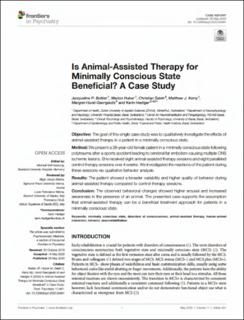Please use this identifier to cite or link to this item:
https://doi.org/10.21256/zhaw-26025| Publication type: | Article in scientific journal |
| Type of review: | Peer review (publication) |
| Title: | Is animal-assisted therapy for minimally conscious state beneficial? : a case study |
| Authors: | Boitier, Jacqueline Patrice Huber, Marion Saleh, Christian Kerry-Krause, Matthew J. Hund-Georgiadis, Margret Hediger, Karin |
| et. al: | No |
| DOI: | 10.3389/fpsyt.2020.00491 10.21256/zhaw-26025 |
| Published in: | Frontiers in Psychiatry |
| Volume(Issue): | 11 |
| Issue: | 491 |
| Issue Date: | 2020 |
| Publisher / Ed. Institution: | Frontiers Research Foundation |
| ISSN: | 1664-0640 |
| Language: | English |
| Subjects: | Animal-assisted therapy; Behavior; Disorder of consciousness; Human-animal interaction; Minimally conscious state; Neurorehabilitation |
| Subject (DDC): | 615.8515: Occupational therapy 616.8: Neurology, diseases of nervous system |
| Abstract: | Objective: The goal of this single case study was to qualitatively investigate the effects of animal-assisted therapy in a patient in a minimally conscious state. Method: We present a 28-year-old female patient in a minimally conscious state following polytrauma after a sports accident leading to cerebral fat embolism causing multiple CNS ischemic lesions. She received eight animal-assisted therapy sessions and eight paralleled control therapy sessions over 4 weeks. We investigated the reactions of the patient during these sessions via qualitative behavior analysis. Results: The patient showed a broader variability and higher quality of behavior during animal-assisted therapy compared to control therapy sessions. Conclusion: The observed behavioral changes showed higher arousal and increased awareness in the presence of an animal. The presented case supports the assumption that animal-assisted therapy can be a beneficial treatment approach for patients in a minimally conscious state. |
| URI: | https://digitalcollection.zhaw.ch/handle/11475/26025 |
| Fulltext version: | Published version |
| License (according to publishing contract): | CC BY 4.0: Attribution 4.0 International |
| Departement: | School of Health Sciences |
| Organisational Unit: | Institute of Public Health (IPH) |
| Appears in collections: | Publikationen Gesundheit |
Files in This Item:
| File | Description | Size | Format | |
|---|---|---|---|---|
| 2020_Boitier-etal_Animal-assisted-therapy-minimally-conscious-state-beneficial_fpsyt.pdf | 12.07 MB | Adobe PDF |  View/Open |
Show full item record
Boitier, J. P., Huber, M., Saleh, C., Kerry-Krause, M. J., Hund-Georgiadis, M., & Hediger, K. (2020). Is animal-assisted therapy for minimally conscious state beneficial? : a case study. Frontiers in Psychiatry, 11(491). https://doi.org/10.3389/fpsyt.2020.00491
Boitier, J.P. et al. (2020) ‘Is animal-assisted therapy for minimally conscious state beneficial? : a case study’, Frontiers in Psychiatry, 11(491). Available at: https://doi.org/10.3389/fpsyt.2020.00491.
J. P. Boitier, M. Huber, C. Saleh, M. J. Kerry-Krause, M. Hund-Georgiadis, and K. Hediger, “Is animal-assisted therapy for minimally conscious state beneficial? : a case study,” Frontiers in Psychiatry, vol. 11, no. 491, 2020, doi: 10.3389/fpsyt.2020.00491.
BOITIER, Jacqueline Patrice, Marion HUBER, Christian SALEH, Matthew J. KERRY-KRAUSE, Margret HUND-GEORGIADIS und Karin HEDIGER, 2020. Is animal-assisted therapy for minimally conscious state beneficial? : a case study. Frontiers in Psychiatry. 2020. Bd. 11, Nr. 491. DOI 10.3389/fpsyt.2020.00491
Boitier, Jacqueline Patrice, Marion Huber, Christian Saleh, Matthew J. Kerry-Krause, Margret Hund-Georgiadis, and Karin Hediger. 2020. “Is Animal-Assisted Therapy for Minimally Conscious State Beneficial? : A Case Study.” Frontiers in Psychiatry 11 (491). https://doi.org/10.3389/fpsyt.2020.00491.
Boitier, Jacqueline Patrice, et al. “Is Animal-Assisted Therapy for Minimally Conscious State Beneficial? : A Case Study.” Frontiers in Psychiatry, vol. 11, no. 491, 2020, https://doi.org/10.3389/fpsyt.2020.00491.
Items in DSpace are protected by copyright, with all rights reserved, unless otherwise indicated.